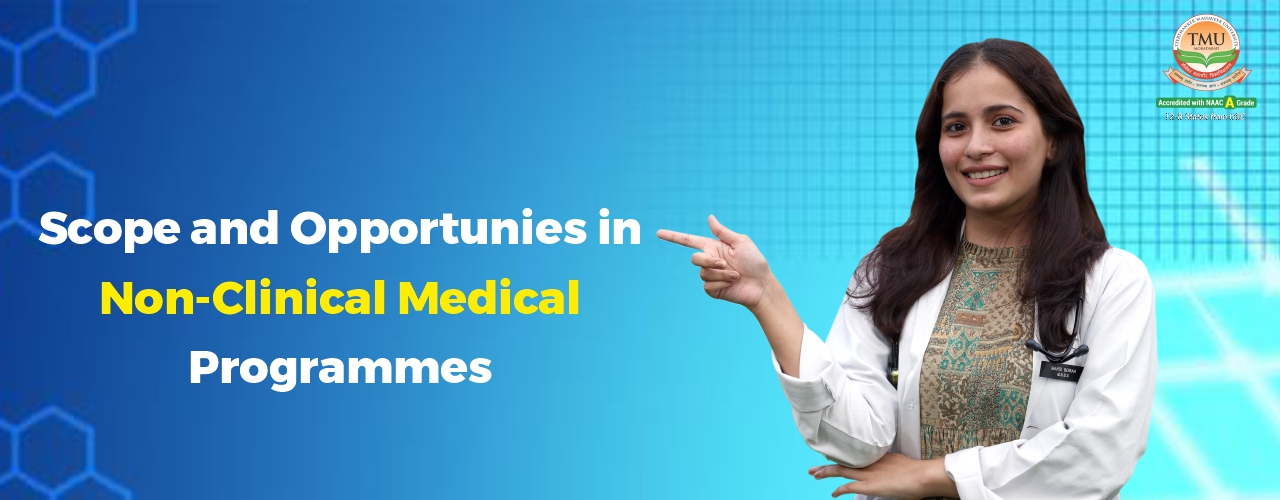Scope and Opportunity through Non-Clinical Medical Programs
Table of Contents
Many MBBS students naturally lean towards clinical programs, attracted by the hands-on patient care these paths offer. However, some find their passion in non-clinical subjects but hesitate to pursue them, fearing limited opportunities. It's essential to shed light on this misconception. Non-clinical programs, whether it's biochemistry or community medicine, offer a world of possibilities just as enriching as the clinical ones.
In the panorama of medical education, the limelight often gravitates toward clinical practices and patient-centred roles. Yet, lurking just beyond this radiant aura lies a realm of equal significance, albeit less heralded. Non-clinical programs, comprising domains like biochemistry, physiology, anatomy, microbiology, pharmacology, forensic medicine and toxicology, and community medicine, offer a different yet significant impetus to medical graduates that remains unparalleled.
Let’s explore some non-clinical avenues post MBBS for you to pursue, which usher in a plethora of opportunities.
MD Biochemistry
Biochemistry offers a deep dive into the molecular mechanisms underpinning life itself at the confluence of biology and chemistry. By deciphering the intricate biomolecules, from DNA to proteins, this discipline illuminates how cells derive energy, communicate, and execute their myriad functions. Biochemistry offers a deep dive into the molecular mechanisms underpinning life itself.Careers for MD Biochemistry graduates include:
- Clinical Biochemists: Often working in hospitals and clinics, they analyze blood and tissue samples to diagnose diseases and may even delve into research, developing new diagnostic tests and treatments.
- Biomedical Scientist: Positioned primarily in research labs, they study the biological basis of diseases and can find opportunities in pharmaceutical companies to develop new drugs.
- Education: An often overlooked yet rewarding avenue, teaching biochemistry at higher education levels allows the sharing of knowledge while also potentially engaging in research.With advancements in personalized medicine, biochemists are now in the spotlight, tailoring treatments to individuals based on their unique biochemical signatures.
Teerthanker Mahaveer University
Apply for Admission
Click Here To Apply for Admission
MD Physiology
Physiology demystifies the functions and interactions of body systems, unravelling the complexity of processes that maintain homeostasis. From understanding cardiac rhythms to elucidating neural pathways, physiologists are at the forefront of these discoveries. Potential career trajectories include:- Physiologists: Often found in research labs, hospitals, or universities, they delve into the intricate functions of living organisms.
- Exercise Physiologist: Positioned in gyms, hospitals, or sports medicine clinics, their expertise helps individuals improve their physical fitness and health.
- Cardiologists: As specialists in heart health, they diagnose and treat heart diseases, ensuring the cardiovascular well-being of patients. The knowledge of human physiology is invaluable in biotechnological firms that design medical devices or diagnostics.
MD Anatomy
As the structural cornerstone of medicine, anatomy provides a detailed map of the human body, from the macroscopic to the microscopic. Potential career paths include:- Pathologist: With a keen eye for disease diagnostics, they examine tissue samples and perform autopsies to diagnose diseases and ascertain causes of death.
- Anatomy Professor: Beyond teaching, they may conduct specialized research, pushing the boundaries of what we know about human structure.
- Medical Illustrator: A unique blend of art and science, these professionals create vivid illustrations of medical concepts and procedures.
- Microbiologists: Engaged in research labs or hospitals, they delve deep into understanding the nature and behaviour of microorganisms.
- Immunologists: They specialize in the study of the immune system, playing pivotal roles in understanding diseases and devising treatments
- Virologist: With a specialization in viruses, they are central to the research and understanding of viral diseases, their treatments, and prevention.
Their contributions are vital in clinical diagnostics, biopharmaceuticals, and environmental sustainability through bioremediation.
MD Pharmacology
In the realm of drug action and interactions, pharmacology is pivotal to modern medicine. Careers for pharmacologists include:Pharmacologists:
Whether in research labs, hospitals, or pharmaceutical companies, they work diligently to understand drug interactions, side effects, and therapeutic potentials.Pharmacologists play an irreplaceable role in drug design, understanding drug repurposing, ensuring the safety and efficacy of medications, and collaborating with regulatory bodies.
MD Forensic Medicine and Toxicology
- Forensic medicine and toxicology marries science with law. Professionals in this field:
- Dive into criminal investigations, using toxicological insights to ascertain the causes of death.
- Collaborate with public health bodies to understand, prevent, and manage poisonings or drug overdoses.
- Their work stands at the thrilling crossroads of pathology, pharmacology, and crime scene analysis.
MD Community Medicine
- Community medicine stands as a beacon for health at the population level. Those trained in this field might:
- Craft effective and informed health policies.
- Engage in managing disease outbreaks.
- Collaborate with NGOs and international bodies like the WHO to ensure better healthcare access and outcomes globally.
- By integrating epidemiology, sociology, and public health practices, professionals in community medicine work tirelessly to enhance healthcare on a massive scale.
Venturing into post-graduation in the fields delineated provides avenues for a rewarding career, transcending the traditional clinical domains often pursued after MBBS. Biochemistry stands as a testament to the profound intricacies of molecular interactions and enzymatic pathways that sustain life. Physiology offers an objective analysis of bodily systems, shedding light on homeostatic mechanisms and cellular dynamics crucial for organismal survival. Anatomy, in its meticulous detail, unravels the structural and functional organization of tissues, organs, and systems, providing a foundational framework for medical sciences. Microbiology presents an empirical study into the vast world of microorganisms, emphasizing their roles in health, disease, and ecological balance. Pharmacology, with its rigorous methodologies, focuses on the pharmacodynamics and pharmacokinetics of drugs, ensuring optimal therapeutic interventions with minimal adversities. Forensic medicine and toxicology, through analytical and biochemical assays, play a pivotal role in medico-legal scenarios, interpreting toxicological data for judicial proceedings. Finally, community medicine, rooted in epidemiology and public health strategies, aims to enhance healthcare delivery systems, ensuring optimal health outcomes at a population level.
For medical students, these fields offer not just knowledge, but also a labyrinth of opportunities. Research, academia, public health policy, and industry beckon with the promise of innovation and impact. The paths, though strewn with challenges, are paved with the allure of discovery and the potential for monumental contributions to humanity's understanding of itself.
Diving into these disciplines, one doesn't merely acquire skills or knowledge. They embark on a quest, a perpetual journey of inquiry and insight. Such is the magnitude and allure of non-clinical programs. It's not merely about charting unfamiliar territories; it's about redefining the contours of medical science and health.
In each of these fields, there's not just a depth of knowledge to be plumbed, but also a breadth of impact to be realized, as they collectively shape the landscape of modern healthcare and beyond.
To read more such insightful content, please visit- TMU Blogs.















